Minsk Forum XX – Vilnius: Zivilgesellschaft, Wirtschaft und Bildung im Exil
Protokolle der Podiumsdiskussionen
I. Perspektiven der belarussischen Opposition im Ausland
Diskussion in drei Gruppen: In Zeiten des Krieges und der Repression – welche Tagesordnung für Belarus?
II. Wirtschaft im Exil: Status quo und Wege der Entwicklung
III. Bildung in Belarus: Zwischen Europäischer Integration und Russischer Kolonisation
Perspektiven der belarussischen Opposition im Ausland
2022 finden im Rahmen des Minsk Forums XX zwei Tageskonferenzen in Litauen und Polen, ein Runder Tisch mit Parlamentariern in Belgien und eine Abschlusskonferenz in Deutschland statt. Die erste Veranstaltung – am 22. Juli im hybriden Format in Vilnius im Startup-Hub Imaguru – hatte unter anderem drei Podiumsdiskussionen im Programm. Die Veranstaltung wurde online übertragen. Die Aufnahmen stehen auf dem YouTube channel der dbg in englischer und russischer Sprache zur Verfügung.
An der ersten Podiumsdiskussion zu den Perspektiven belarussischer Zivilgesellschaft im Ausland nahmen Andrei Strischak (Menschenrechtler und Direktor der Solidaritätsstiftung BYSOL), Polina Brodik (Koordinatorin von Free Belarus Center in Kyjiw), Alexei Lukaschewitsch (Projektmanager beim Belarussischen Youth-Hub in Warschau) und Jelena Schiwoglod (Leiterin der Initiative „Ehrliche Leute“) teil.
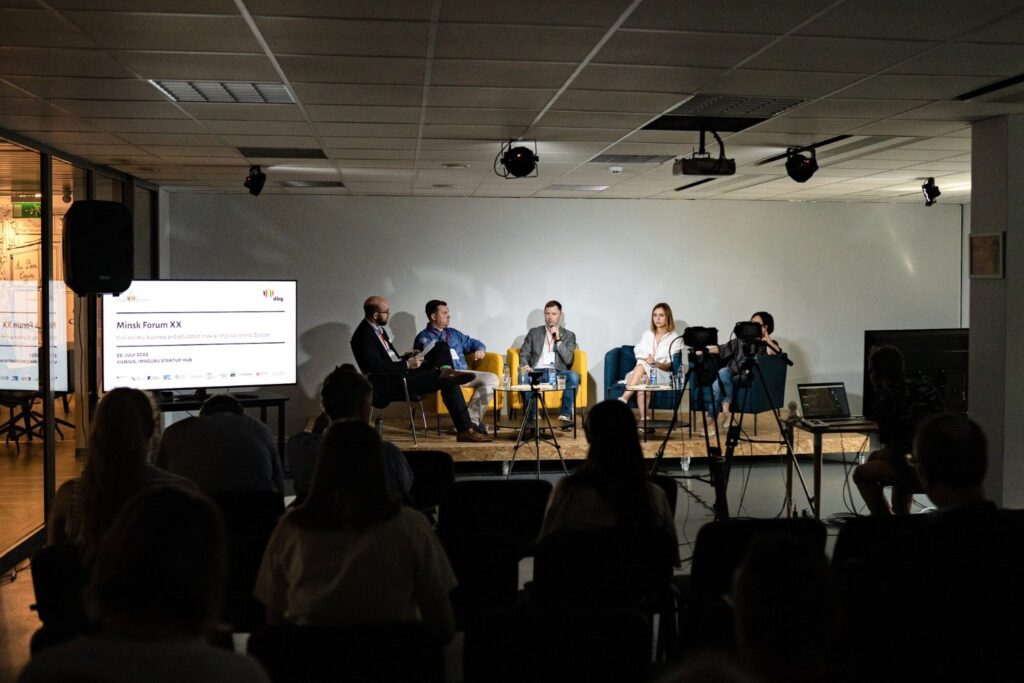
Jelena Schiwoglod widersprach der weit verbreiteten Meinung, dass die Zivilgesellschaft in Belarus vollständig vernichtet sei. Gleichwohl wies sie auf folgende Probleme hin:
- fehlende Verbindung zum Staat, der nach wie vor nicht daran interessiert sei, sich um einfache alltägliche Angelegenheiten wie etwa einen verletzten Vogel oder eine kaputte Straße zu kümmern;
- fehlende finanzielle Transparenz, was die Arbeit im Inland angeht;
- Schwierigkeiten, die Tätigkeit aufgrund steigender Risiken einzuschätzen, da die Gemeinschaften sich im Inland befinden, während die Organisationen im Ausland tätig sind.
Außerdem bestehe Nachfrage nach einer einenden, wertebasierten Idee. Den aktuellen Diskurs hält sie für problematisch, denn alle redeten nur über Personen und nicht über Inhalte. Dies dürfte eine Anspielung gewesen sein auf das zweite Forum der Demokratischen Kräfte von Belarus, das vor kurzem in Berlin stattgefunden hatte und bei dem Konflikte innerhalb des oppositionellen Exils zu Tage getreten waren.
Eine weiterer wichtiger Aspekt im Beitrag von Jelena Schiwoglod war ihre Beschreibung der Rolle von Organisationen und Strukturen der Diaspora. Die seien häufig im humanitären Bereich aktiv und schenkten der Entwicklung von Ideen und Projekten wenig Aufmerksamkeit, welche die Frage nach den Zielen des Kampfes beantworten könnten, und zwar nicht im Sinne von „gegen jemanden“, sondern im Sinne von „für etwas“.
Auf das vorhandene Potential hatte Tatjana Marinitsch, Gründerin des Start-up-Hubs Imaguru, in ihrer Begrüßungsrede hingewiesen:
„Die im Ausland lebenden Belaruss*innen sind aktiv in zivilgesellschaftliche, soziale und wirtschaftliche Prozesse involviert. Sie alle bilden ein enormes soziales und geistiges Kapital, das nicht nur für die Zukunft von Belarus, sondern von ganz Europa genutzt werden kann und soll.“
Andrei Strischak unterstützte den Gedanken von Jelena Schiwoglod, dass Zusammenschlüsse aufgrund von Ideen und nicht Personen erfolgen sollten: Die Opposition befinde sich gerade am Scheideweg, an einem Punkt, an dem entweder die Einigung der Kräfte verpasst werde – dann laufe alles weiter wie bisher – oder es komme doch noch zu Übereinkünften.
Auf die Frage des Moderators Jakob Wöllenstein, Leiter des Auslandsbüros Belarus der Konrad-Adenauer-Stiftung, woran die Einigung der Opposition scheitere, sagte Andrei Strischak, dass es weder an mangelnder Kommunikation liege, noch daran, dass neue Plattformen dafür geschaffen werden müssten; es mangele an Zusammenarbeit und einer gemeinsamen Wertebasis, die Belaruss*innen und auch die Zivilgesellschaft vereinen könnten.
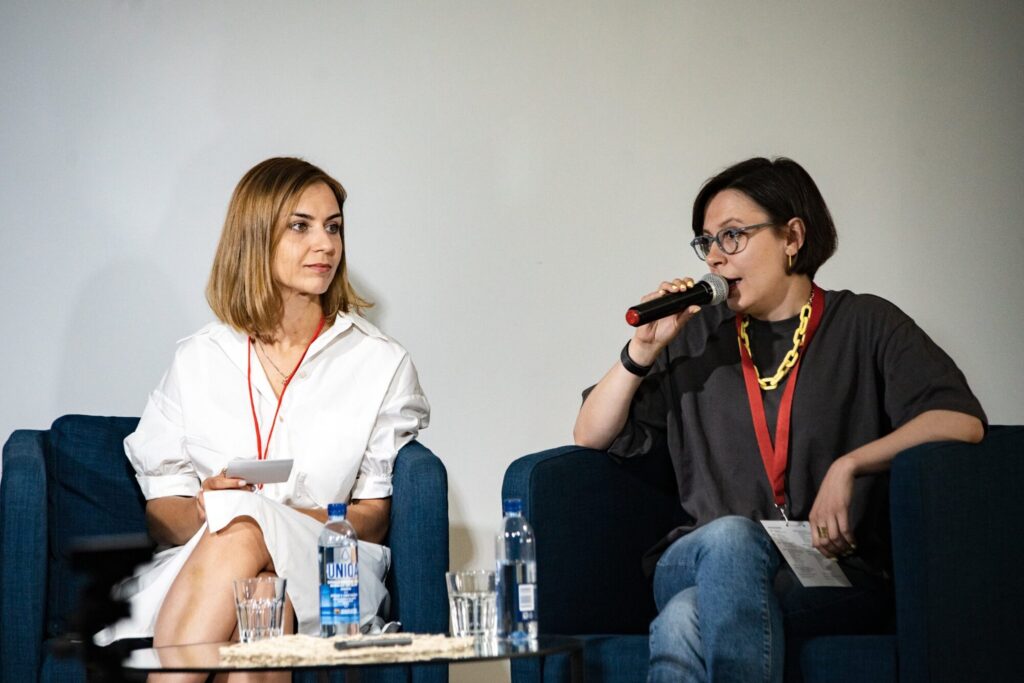
Polina Brodik sprach weniger über Konflikte an der Spitze der Opposition, sondern mehr über die Rolle der Graswurzel-Initiativen und über neue Mitstreiter, die stärker eingebunden werden sollten. Außerdem sagte Polina Brodik, dass sie immer öfter Diskussionen über belarussische Nationalinteressen wahrnehme. Diese Interessen seien ihrer Meinung nach werteorientiert und bedeuteten kein ‚Überfokussieren auf ethnische Kategorien‘.
Alle Teilnehmenden der ersten Podiumsdiskussion sprachen die Konflikte innerhalb der Opposition an; sie stimmten darin überein, dass weniger Personen als die von ihnen vertretenen Ideen und Konzepte ausschlaggebend seien. Warum gibt es aber immer noch Konflikte, wenn dies Konsens ist? Und wie wahrscheinlich ist es, dass solch eine vereinigende Idee gefunden und formuliert wird? Unbestritten verfügt Swetlana Tichanowskaja als Person über große Integrationskraft, jedoch nicht alle wollen sich hinter ihr versammeln, da divergierende Ideen und Konzepte dem entgegenstehen.
In Zeiten des Krieges und der Repression – welche Tagesordnung für Belarus?
Nach dem ersten Podium wurde in drei Gruppen diskutiert, die anschließend dem Plenum ihre Ergbnisse vorstellten.
Die erste Gruppe thematiiserte die Abwanderung hochqualifizierter Fachkräfte aus Belarus. Es gebe zwei Formen der Unterstützung von Auswanderern: kurzfristige und langfristige Hilfsprogramme. Bei den kurzfristigen Programmen handelt es sich um Hilfe bei der Integration im neuen Land, z.B. Sprachkurse, das Erlernen neuer Berufe etc. Diese Angebote sind viel zahlreicher als langfristige Programme. Unter letzteren versteht man die individuelle Förderung: für Menschenrechtler*innen oder Akademiker*innen durch die Einladung zu Forschungsaufenthalten oder die Vergabe von Stipendien. Es wurde an die Situation des armenischen Volkes erinnert, das größtenteils außerhalb von Armenien lebt.
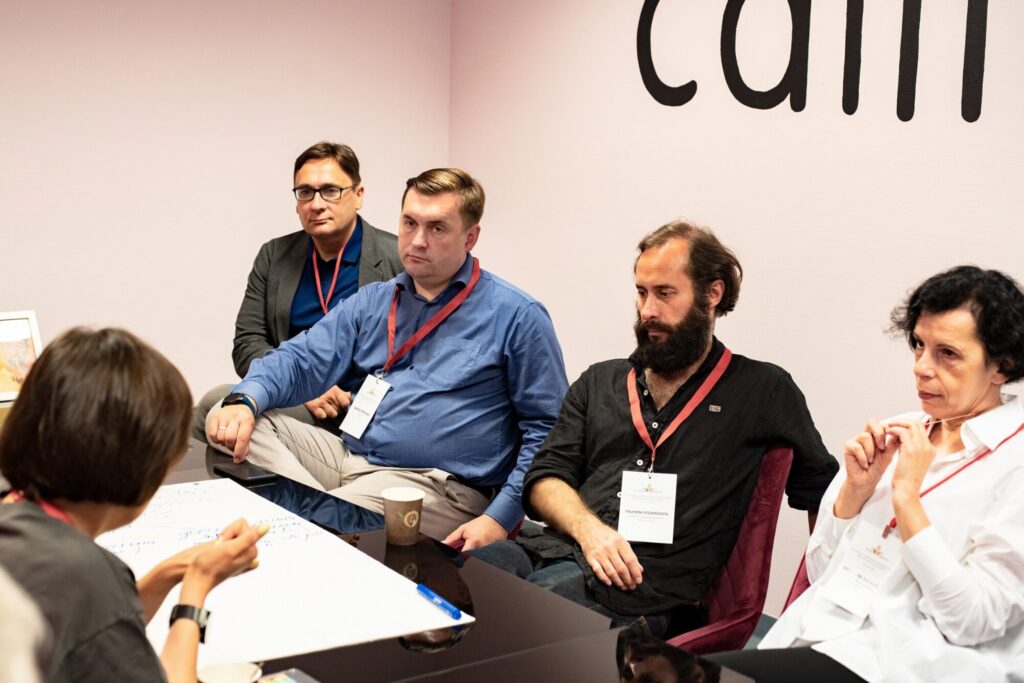
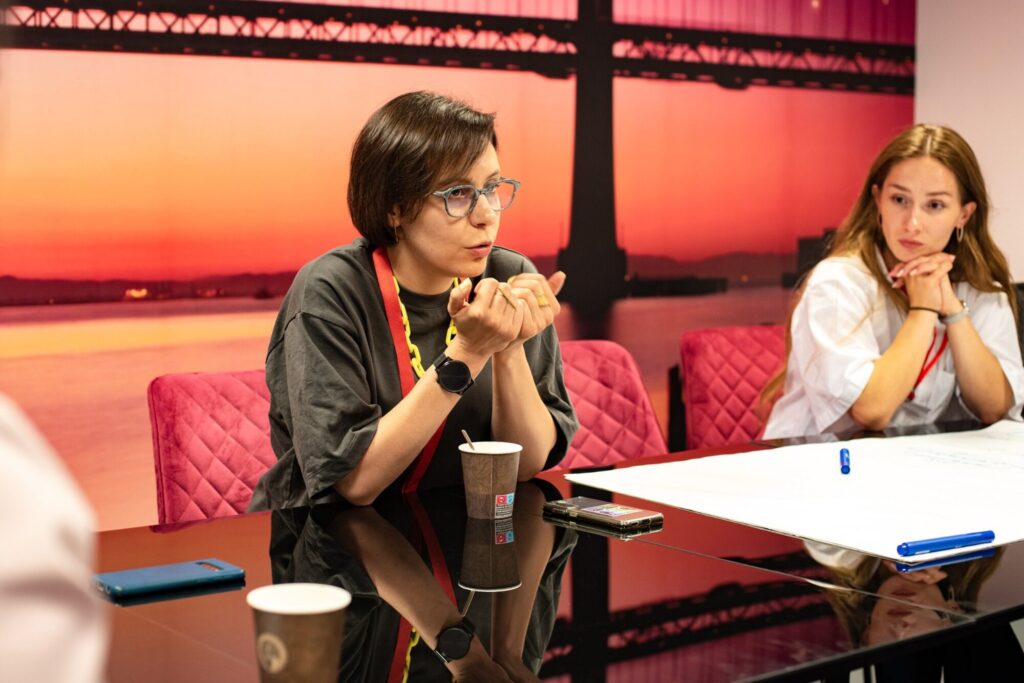
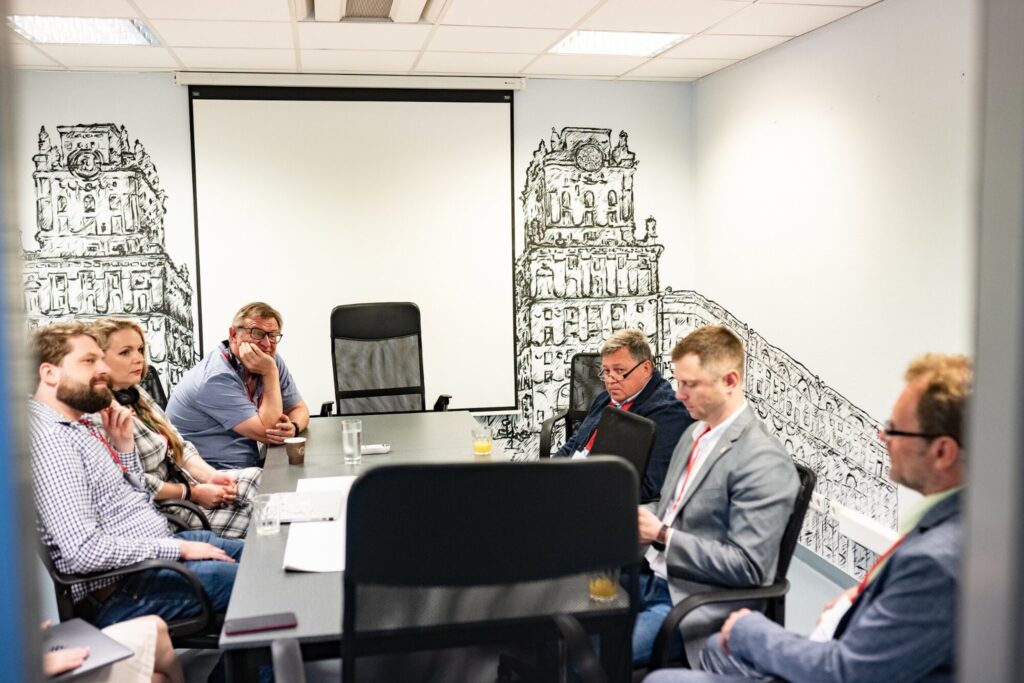
Die zweite Gruppe formulierte als Erwartungen an die Opposition:
- dass Swetlana Tichanowskaja im Dialog mit der Ukraine und deren Präsidenten Selenski die Rolle des demokratischen Belarus im aktuellen Krieg erläutern kann;
- dass sich eine Antikriegsbewegung bilden wird;
- dass Swetlana Tichanowskaja in der Lage sein wird, konkrete Probleme von Belaruss*innen im Ausland zu lösen, z.B. bei der Erteilung von Visa, Aufenthaltserlaubnissen usw.;
- dass alle demokratischen Kräfte angesichts des Krieges mobil werden.
Die demokratische Opposition sollte:
- eine klare und deutliche Position zum Krieg beziehen, wobei der Fokus einerseits darauf liegen kann, dass das demokratische Belarus voll und ganz die Ukraine unterstützt und Russland nicht unterstützt; andererseits sollte betont werden, dass Russland nicht mit Putin und Belarus nicht mit Lukaschenko gleichzusetzen ist;
- klar und deutlich die Werte sowie die Wahl des unabhängigen Belarus benennen; Strukturen der Zivilgesellschaft, Stäbe, demokratische Strukturen aktivieren und dabei immer ‚bei sich anfangen‘;
sog. ‚Parallelwelten‘ – demokratische Strukturen, Diaspora und Zivilgesellschaft im Inland – zusammenbringen.
Die dritte Gruppe besprach Möglichkeiten, wie der internationalen Gemeinschaft deutlich gemacht werden kann, dass das demokratische Belarus gegen den Krieg in der Ukraine ist:
- Handlungen und Bemühungen von Belaruss*innen sollen betont werden, die den Sieg der Ukraine befördern: Zum Beispiel durch militärische Beteiligung auf ukrainischer Seite, die Bildung von belarussischen Regimentern, den Kauf von Drohnen, Medikamenten etc.;
- außerdem sollte immer wieder daran erinnert werden, dass viele exilierte Belaruss*innen in der Ukraine geblieben sind und dort ihre ehrenamtliche Arbeit unter Kriegsbedingungen fortführen.
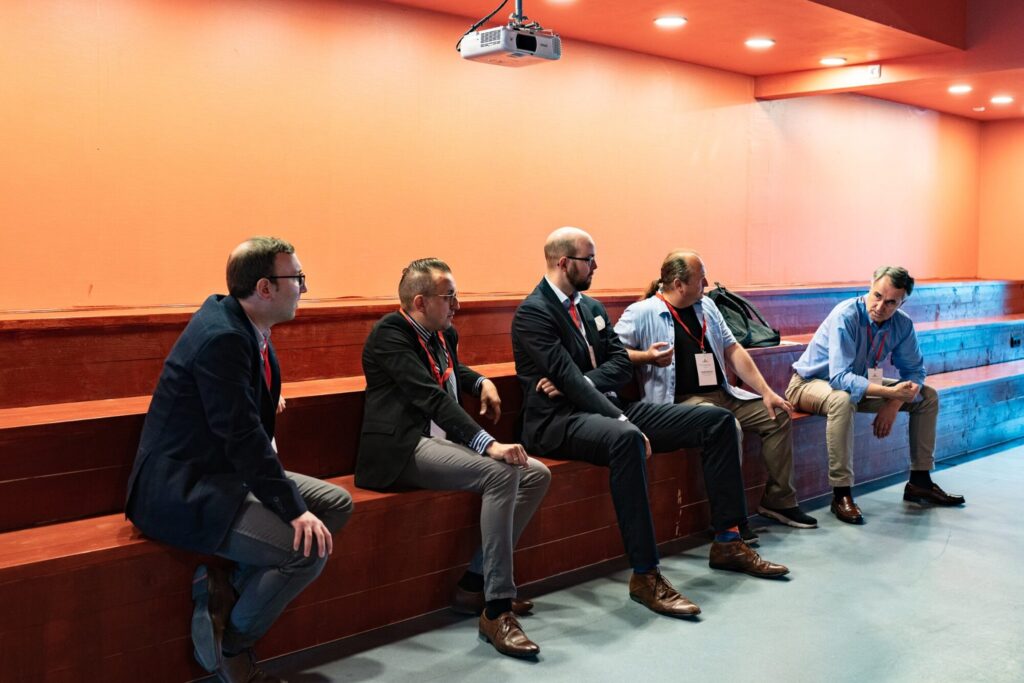
Wirtschaft im Exil: Status quo und Wege der Entwicklung
Die zweite Podiumsdiskussion war dem Thema „Unternehmen im Exil“ gewidmet. Die Teilnehmer*innen waren: Tatjana Marinitsch (Gründerin des Startup-Hubs Imaguru), Waleri Zepkalo (Direktor des Belarus High-Tech-Parks 2005-2017, Kandidat bei den Präsidentschaftswahlen 2020) und Pawel Daneiko (Verwaltungsdirektor des Zentrums für Wirtschaftsforschung BEROC).
Tatjana Marinitsch merkte an, dass die Verlagerung der Unternehmen in den letzten zwei Jahren in einigen Wellen verlief. Verfolgungen und Drohungen gegenüber Unternehmen führten zur ersten Abwanderungenswelle. Die zweite hing mit den insgesamt schlechten Arbeitsbedingungen in Belarus zusammen.
Folgende Herausforderungen haben Unternehmen beim Standortwechsel zu bewältigen:
- Rechtliche Formalitäten (Visa, Ausreiseerlaubnis für Familienmitglieder, Versicherungen);
- Image-Einbußen: Man will mit Menschen mit einem belarussischen Pass nicht zusammenarbeiten, ihnen wird die Kontoeröffnung bei Banken verweigert, der Zugang zu Förderprogrammen verwehrt usw.;
Pawel Daneiko erinnerte an mehrere Wellen von Unternehmensverlagerungen aus Belarus. Die gegenwärtige Welle ist seiner Ansicht nach die stärkste. Nach seiner Einschätzung dürfte es ungefähr zwei Jahre dauern, um die Infrastruktur für die verlagerten Unternehmen aufzubauen.
Waleri Zepkalo betonte, dass die Unterstützung sich je nach Land unterschiedlich gestaltet. In Polen zum Beispiel verlaufe die Interaktion mit lokalen Behörden recht unkompliziert. In Deutschland werde die Situation dadurch erschwert, dass für den Erhalt einer Blauen Karte ein relativ hohes Gehalt nachgewiesen werden müsse, was wiederum nur erfahrenen Fachkräften, den sogenannten Seniors, gelinge. Für die Middles und Juniors komme Deutschland deswegen kaum als Auswanderungsland in Frage. In Litauen sei die Situation im ersten Jahr nach den Wahlen besser gewesen. Später jedoch, je mehr Menschen ins Land strömten, hätten sich litauische Behörden ‚zunehmend gestresster‘ gezeigt und dann nicht mehr so gern geholfen. Am stärksten gefährdet sind für Zepkalo diejenigen, die in Belarus verbleiben und keine europäische Bankkonten nutzen können.
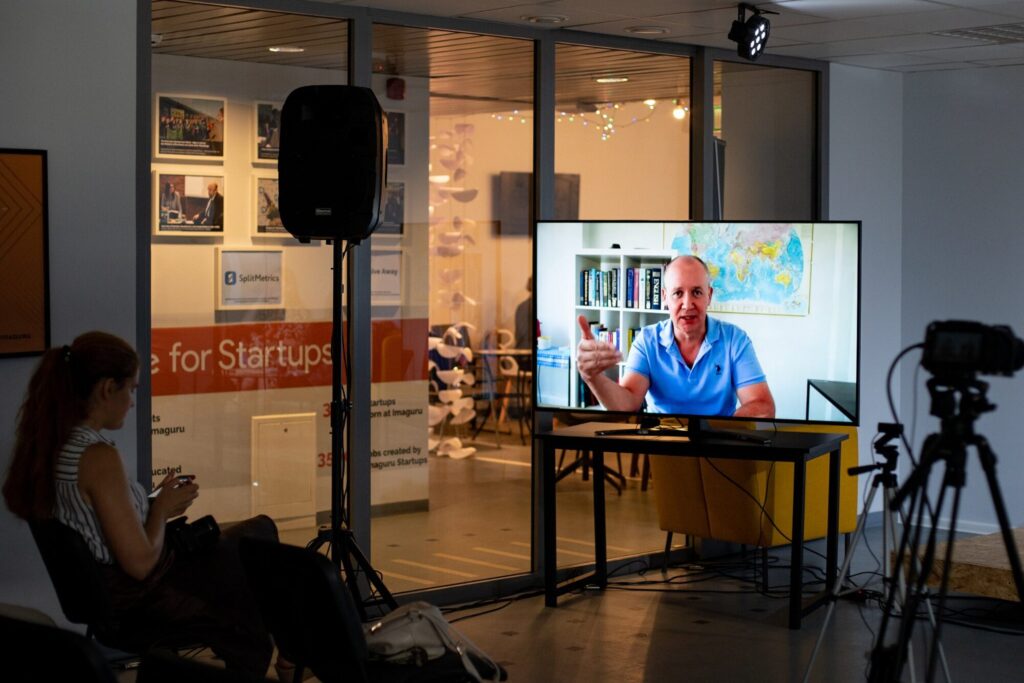
Von allen Berufsgruppen, die gezwungen sind, Belarus zu verlassen, haben Beschäftigte im IT-Sektors die geringsten Probleme. Aufgrund der Besonderheiten ihrer beruflichen Tätigkeit finden sie leichter und schneller einen Job an einem neuen Ort als beispielsweise Fachkräfte aus dem Kultur- und Bildungsbereich oder Fabrikarbeiter.
Bildung in Belarus: Zwischen Europäischer Integration und Russischer Kolonisation
Die dritte und abschließende Podiumsdiskussion behandelte das Thema Bildung in Belarus. Es dskutierten Tatjana Schtschitzowa (Professorin der Europäischen Humanistischen Universität, Vertreterin für Bildung und Wissenschaft im Kabinett von Swetlana Tichanowskaja), Pawel Tereschkowitsch (Professor, Mitglied des Gesellschaftlichen Bologna-Komitees), Marianna Sakalowa (Bildungsbüro für das neue Belarus, Programm „Belarussische Bildung im Wandel“ , Beraterin des Projekts Beehive), Kamil Kłysiński (Senior Fellow am Zentrum für Oststudien, Bereich Ukraine, Belarus und Republik Moldau).
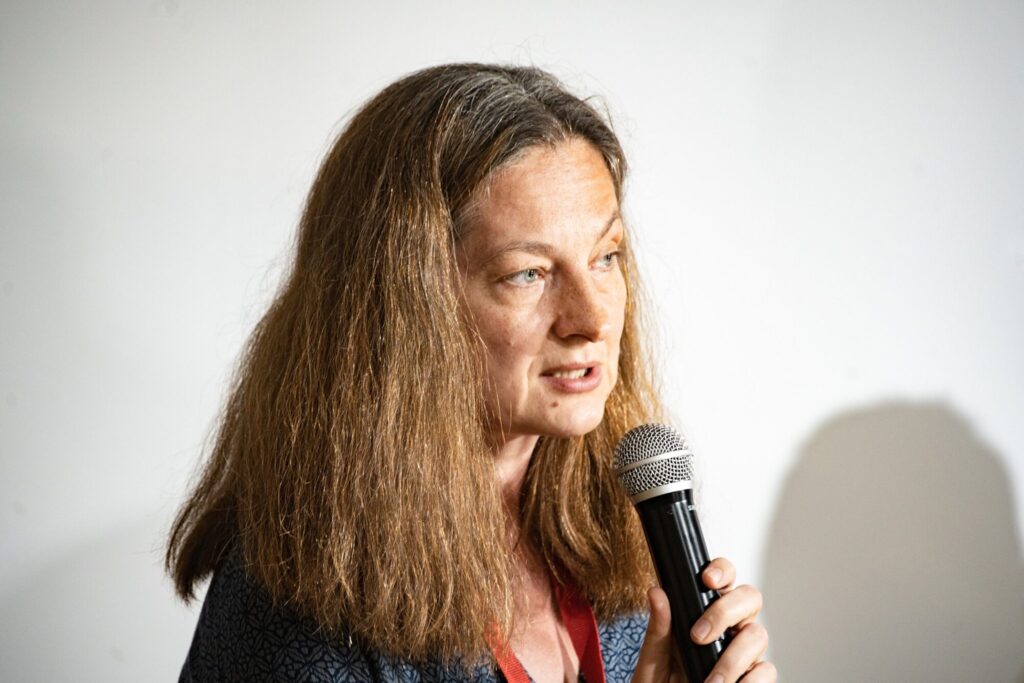
Moderarator Andrei Lawruchin (Experte im Bereich Bildung, Wissenschaft und Innovationen, Belarussisches Institut für strategische Forschungen BISS) benannte folgende Trends im belarussischen Bildungssektor:
- Abschottung gegenüber dem Westen: Einstellung von internationalen Programmen, keine Anknüpfung an die Instrumente der Bildungspolitik, darunter den Bologna-Prozess, Schließung der belarussischen Büros des Goethe-Instituts, des DAAD und anderer Bildungsinstitutionen;
- Günstige Bedingungen für die Integration Richtung Osten (Russland), darunter bevorstehende Finanzspritzen in diesem Bereich.
Tatjana Schtschitzowa zitierte mehrfach aus der Studie „Stolpernder Bär, schwebender Drache: Russland, China und Geopolitik in der globalen Wissenschaft“ des King’s College in London. Es sei äußerst wichtig, die Entwicklung der Geisteswissenschaften von außen zu unterstützen; sie berichtete, welche Programme dafür bereits geschaffen wurden und im Moment oder in naher Zukunft umgesetzt werden, darunter auch Programme für Forscher*innen in Belarus.
Pawel Tereschkowitsch erinnerte daran, dass Malta, Irland und Belarus die drei Länder in Europa sind, in denen Bildung nicht in ihren Nationalsprachen stattfindet.
Sakalowa merkte an, dass die wissenschaftliche Gemeinschaft heute über nur wenige Möglichkeiten verfüge, um die Situation in Belarus zu beeinflussen. Sie schlug vor, sich auf künftige Bildungsreformen vorzubereiten. Ein entsprechender Reformentwurf sei bereits vom ‚Bildungsbüro für das neue Belarus‘ erarbeitet worden.
Kłysiński wies darauf hin, dass es kaum Feedback und Austausch zwischen Initiativen und Organisationen gebe, die sich im Bereich Bildung und bei der Unterstützung der Forschungs- und studentischen Gemeinschaften engagieren. Er schlug vor, eine Konferenz ins Leben zu rufen, die eine Lösung für dieses Problem sucht. Diese Idee fand lebhaften Anklang.
Die Ergebnisse des Treffens in Vilnius zeigen, dass die belarussische Zivilgesellschaft, Wirtschaft und Bildungscommunity sich außerhalb von Belarus – wenn auch unterschiedlich erfolgreich – weiterentwickeln und zu einem festen Bestandteil der politischen Landschaft der Europäischen Union werden.
Vika Biran für die deutsch-belarussische gesellschaft e.V., Juli 2022